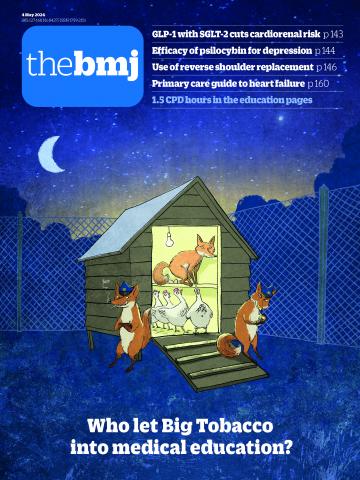
Tobacco policy: making a stand

BMJ Group’s stringent tobacco policy exemplifies our long
standing dedication to independent publishing.”Dr Helen Macdonald
Publication ethics and content integrity editor
Recognising the harmful impact of the tobacco industry—responsible for killing up to two-thirds of long-term users—we have excluded tobacco-sponsored research from our publications for over a decade. It’s important to note that while our initial policy was a significant step, it did not cover all journals but rather a minority.
We strive for comprehensive coverage in our ongoing efforts to maintain integrity in our publishing practices. As a result, in 2024, we extended our policy to cover all content types and to exclude authors with personal financial interests with tobacco companies or tobacco-related subsidiary companies or organisations. These
measures strengthen our editorial integrity by supporting the independence of research from commercial interests, and the publication of independent, trusted
research, contributing to a healthier world.
The BMJ Investigations Unit: journalism with a global impact
The BMJ believes in investigative journalism as a force for change. Over the past decade, our investigative journalism has unearthed research fraud and misconduct, prompted improvements in the transparency of clinical research, led to changes in guidelines and clinical practice, and triggered parliamentary
inquiries.
As a direct result of this work, medical education provider Medscape bowed to pressure and agreed to permanently remove a series of accredited medical education courses on smoking cessation funded by the tobacco industry giant Philip Morris International (PMI).
The global company acknowledged its “misjudgment” in a letter to complainants and said it will not accept funding from any organisation affiliated with the tobacco industry in the future.
The move came after an investigation by The BMJ revealed the PMI deal and the widespread protests among doctors and academics in reaction to the
partnership.

Investigation finds tobacco funded research still appearing in top medical journals
Tobacco-funded research is still appearing in highly-cited medical journals – despite attempts by some to cut ties altogether, found an investigation by The Investigative Desk and The BMJ.
Although the tobacco industry has a long history of subverting science, most leading medical journals don’t have policies which ban research wholly or partly funded by the industry.
And even when publishers, authors and universities are willing to restrict tobacco industry ties, they struggle to identify funding sources because tobacco companies have funded front groups and have diversified into pharmaceutical and health technology fields.
These investments include treatments for conditions caused or aggravated by smoking, such as lung cancer, heart disease, and asthma.
These ties complicate ongoing efforts of researchers, scientific organisations and journals to distance themselves from the industry and has led to calls for journals to not only institute bans on research by tobacco companies but also on their subsidiaries.
The Investigative Desk and The BMJ searched the PubMed database and found hundreds of relationships between Big Tobacco’s medical and pharmaceutical subsidiaries and medical research.
They also checked the tobacco policies of 10 leading general medical journals and 10 journals in each of the three therapeutic areas especially affected by smoking.
Of those 40 journals, only 8 (20%) had policies prohibiting studies wholly or partly funded by the tobacco industry. Of the 10 journals in the field of respiratory medicine, six had a tobacco policy, but in oncology only one did, and in cardiology, none had one. Among the 10 general medicine journals, only The BMJ had such a policy.
BMJ Group has updated its 2013 tobacco policy. In addition to excluding research funded by the tobacco industry, BMJ journals will also exclude work where authors have personal financial ties to the tobacco industry.
The updated policy is one action BMJ journals can take to reduce the publication of content which downplays the harms of smoking or hinders the creation of a world free from the harms of smoking. Creating a stronger firewall between the tobacco industry and BMJ content will provide space for editors to curate and publish content that is more independent and trusted, and contributes to a healthier world.””
Ruth Malone
Professor of social behavioural sciences at the University of California and former editor-in-chief of BMJ Group’s Tobacco Control journal






